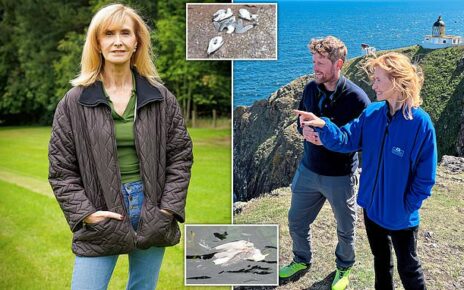FATHER of evolutionary theory Charles Darwin gives his name to his groundbreaking thesis.
Darwinism expands beyond historic evolution but also refers metaphorically to our society and Darwinian systems we have in place.
What is Darwinism?
Darwinism is the theory of evolution and how humans and the world around us came to be.
Darwinian theory relies on the idea of natural selection and survival of the fittest.
The core idea behind Darwinism is that the strongest will survive and a new, stronger species will rise from what came before.
Metaphorically speaking, Darwinian systems are ones in which competition is high and only the strongest survive.

This can apply to capitalism and businesses or individual people struggling to move up the career ladder.
In his speech stepping down as leader of the Conservative Party, Boris Johnson said: "Our brilliant and Darwinian system will produce another leader."
READ MORE ON BORIS JOHNSON

Boris Johnson appoints new cabinet as PM resists leaving No.10 immediately

Carrie and baby Romy support Boris as he thanks them in resignation speech
Johnson was referring to the constant and competitive world of politics in which a stronger or preferred personality will always emerge to take over.
When was Darwinism created?
In 1859, Charles Darwin published On the Origin of Species and the phrase Darwinism was coined a year later.
Thomas Huxley, who coined the term, said of the theory: "How extremely stupid not to have thought of that!"
In 1837, six months after returning to England from his world wide trip on the HMS Beagle, he began to theorise that one species could become another.
The book was a work of scientific literature and is considered the foundation of modern evolutionary theory.
His work showed evidence of branching patterns within evolution and the process of natural selection.
LaTEST IN SCIENCE
START UP 
Large Hadron Collider STARTS with new discovery sparking theories of portals

Why 'Will the world end on July 5th?' is trending explained

Fears over Nasa plot to bring back Mars samples that 'could unleash alien virus'

Where to look to spot sunrises and sunsets – but you need good weather
Since the 1800s, this theory has vastly been accepted as science fact although creationists disagree.
Darwinism and Darwinian theory has become synonymous with evolution and is often called survival of the fittest.
Who was Charles Darwin?
Charles Robert Darwin was born 12 February 1809, in his family home in Shrewsbury, Shropshire.
He was the fifth of six children born to society doctor and financier Robert Darwin and his wife Susannah Darwin.
During his time at Christ's College, Cambridge, he became fascinated with bug collecting.
Darwin secured a place on the HMS Beagle, an explorer ship, and gathered geological and natural history artefacts from across the globe.
He visited places like the Galapagos Islands, which are full of incredible animals.
In the 1830s, Darwin started working with zoologists and helping figure out fossils he had collected, such as the giant armadillo Glyptodon.
He worked with the Geological Society to continue exploring his theories, although the workload took a toll on his heart.
While ill, he stayed with his family in Staffordshire, including his soon to be wife Emma Wedgewood – who was also his cousin.
When he recovered, he continued his work and built his theory from botany and small creatures to humans.
Read More on The Sun

Urgent warning for BILLIONS of iPhone users to change your settings NOW

I transformed my garden for just £20 – it took less than a day
He died at Down House on 19 April 1882, leaving behind his wife and 10 children.
Darwin was buried in Westminster Abbey, near Isaac Newton, in a funeral which was attended by thousands of dignitaries, philosophers and friends.
Source: Read Full Article


